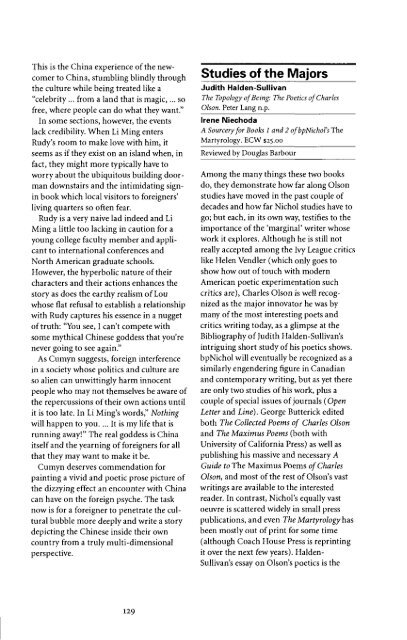The Carpathians - University of British Columbia
The Carpathians - University of British Columbia
The Carpathians - University of British Columbia
Create successful ePaper yourself
Turn your PDF publications into a flip-book with our unique Google optimized e-Paper software.
This is the China experience <strong>of</strong> the newcomer<br />
to China, stumbling blindly through<br />
the culture while being treated like a<br />
"celebrity ... from a land that is magic,... so<br />
free, where people can do what they want."<br />
In some sections, however, the events<br />
lack credibility. When Li Ming enters<br />
Rudy's room to make love with him, it<br />
seems as if they exist on an island when, in<br />
fact, they might more typically have to<br />
worry about the ubiquitous building doorman<br />
downstairs and the intimidating signin<br />
book which local visitors to foreigners'<br />
living quarters so <strong>of</strong>ten fear.<br />
Rudy is a very naive lad indeed and Li<br />
Ming a little too lacking in caution for a<br />
young college faculty member and applicant<br />
to international conferences and<br />
North American graduate schools.<br />
However, the hyperbolic nature <strong>of</strong> their<br />
characters and their actions enhances the<br />
story as does the earthy realism <strong>of</strong> Lou<br />
whose fiat refusal to establish a relationship<br />
with Rudy captures his essence in a nugget<br />
<strong>of</strong> truth: "You see, I can't compete with<br />
some mythical Chinese goddess that you're<br />
never going to see again."<br />
As Cumyn suggests, foreign interference<br />
in a society whose politics and culture are<br />
so alien can unwittingly harm innocent<br />
people who may not themselves be aware <strong>of</strong><br />
the repercussions <strong>of</strong> their own actions until<br />
it is too late. In Li Ming's words," Nothing<br />
will happen to you. ... It is my life that is<br />
running away!" <strong>The</strong> real goddess is China<br />
itself and the yearning <strong>of</strong> foreigners for all<br />
that they may want to make it be.<br />
Cumyn deserves commendation for<br />
painting a vivid and poetic prose picture <strong>of</strong><br />
the dizzying effect an encounter with China<br />
can have on the foreign psyche. <strong>The</strong> task<br />
now is for a foreigner to penetrate the cultural<br />
bubble more deeply and write a story<br />
depicting the Chinese inside their own<br />
country from a truly multi-dimensional<br />
perspective.<br />
Studies <strong>of</strong> the Majors<br />
Judith Halden-Sullivan<br />
<strong>The</strong> Topology <strong>of</strong> Being: <strong>The</strong> Poetics <strong>of</strong> Charles<br />
Olson. Peter Lang n.p.<br />
Irene Niechoda<br />
A Sourcery for Books I and 2 <strong>of</strong>bpNichol's <strong>The</strong><br />
Martyrology. ECW $25.00<br />
Reviewed by Douglas Barbour<br />
Among the many things these two books<br />
do, they demonstrate how far along Olson<br />
studies have moved in the past couple <strong>of</strong><br />
decades and how far Nichol studies have to<br />
go; but each, in its own way, testifies to the<br />
importance <strong>of</strong> the 'marginal' writer whose<br />
work it explores. Although he is still not<br />
really accepted among the Ivy League critics<br />
like Helen Vendler (which only goes to<br />
show how out <strong>of</strong> touch with modern<br />
American poetic experimentation such<br />
critics are), Charles Olson is well recognized<br />
as the major innovator he was by<br />
many <strong>of</strong> the most interesting poets and<br />
critics writing today, as a glimpse at the<br />
Bibliography <strong>of</strong> Judith Halden-Sullivan's<br />
intriguing short study <strong>of</strong> his poetics shows.<br />
bpNichol will eventually be recognized as a<br />
similarly engendering figure in Canadian<br />
and contemporary writing, but as yet there<br />
are only two studies <strong>of</strong> his work, plus a<br />
couple <strong>of</strong> special issues <strong>of</strong> journals (Open<br />
Letter and Line). George Butterick edited<br />
both <strong>The</strong> Collected Poems <strong>of</strong> Charles Olson<br />
and <strong>The</strong> Maximus Poems (both with<br />
<strong>University</strong> <strong>of</strong> California Press) as well as<br />
publishing his massive and necessary A<br />
Guide to <strong>The</strong> Maximus Poems <strong>of</strong> Charles<br />
Olson, and most <strong>of</strong> the rest <strong>of</strong> Olson's vast<br />
writings are available to the interested<br />
reader. In contrast, Nichol's equally vast<br />
oeuvre is scattered widely in small press<br />
publications, and even <strong>The</strong> Martyrology has<br />
been mostly out <strong>of</strong> print for some time<br />
(although Coach House Press is reprinting<br />
it over the next few years). Halden-<br />
Sullivan's essay on Olson's poetics is the

















